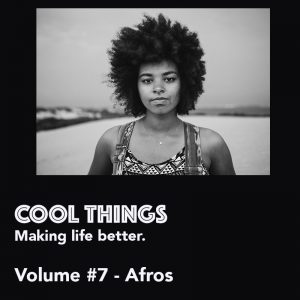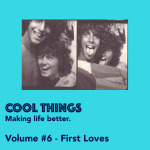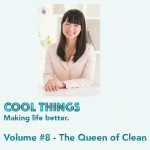Cool Things. Volume #7. Afros.
THE AFRO: A STATEMENT OF SELF
Chris Rock’s controversial 2009 documentary Good Hair was inspired by a single question from his three year old daughter – How come I don’t have good hair?
Rock’s quest to provide an answer is the basis for the insightful and hilarious film, a behind the scenes expose of what drives the ten billion dollar annual black hair care industry. From relaxers to weaves to wigs, African American women will do just about anything to have perceived ‘good hair’. (Good meaning anything that doesn’t look like an Afro.)
The film had its share of comic moments although it was the darker side of the story that troubled me.
THE WRONG MESSAGE
While Rock’s documentary only touched on the struggle African-Americans have with their hair and identity, this issue resonated the most. How hair creates a bizarre pecking order within the African-American community. Good hair – meaning straight, shiny hair – equates to status. Afros or dreads are considered base, too primal.
More troubling: at the tender age of three, Rock’s daughter already figured out the message: Afros are somehow WRONG.
I argue the Afro is a unique masterpiece deserving of showcase. Wild and untamed, they are more ferocious than any ninety dollar blowout. In this era of diversity and acceptance, it makes no sense, on paper, that the Afro remains shunned.
So why does it?
The answer isn’t so complicated. Not when two influential industries continue to foster the wrong message.
CULPRIT #1 – HOLLYWOOD
When Chris Rock infamously hosted the Oscars in 2016, he took the notoriously conservative Oscars to task over the lack of recognition for black actors.
Not surprisingly, the slim group of feted black actors are ones who’ve fallen in line with the good hair = straight hair equation. Kerry Washington, Octavia Spencer, Oprah, Denzel…the list goes on. None of these celebrities rock Afros; not in the big, public moments. And likely fewer of them will, considering what happened with Halle Berry.
Halle was the first black woman to win the Best Actress Oscar and she accepted this prize in 2002 with a cropped hair do. But when she showed up at the Oscars in 2017 rocking a head full of natural curls, social media exploded in outrage. She was encouraged to fire her hair stylist!
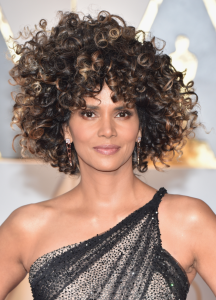
QUEEN!
And what black actress sports an Afro in a film or TV show whose character isn’t specifically ghetto or street? In every way, Hollywood perpetrates the negative Afro caricature. It’s no wonder the African-American community distances themselves from this hair image.
Unfortunately, this won’t change anytime soon. Hollywood isn’t quick to change its ways. Further, the Afro faces opposition from another powerful source.
CULPRIT #2 – FASHION/BEAUTY
The fashion and beauty industries have slowly started to embrace ‘perceived’ imperfection. Plus sized models, real aged women (wrinkles and all), crooked teeth etc. crop up in advertising on a more regular, if curated, basis.
But the Afro remains an outlier.
In July of 2018, two African-American women models at a casting call for Miami Swim Week called out the event when told black models or Afro’s weren’t being considered. (In Miami of all places, one of America’s largest metropolitan black populations!)
A quick flip through on-line fashion catalogues and you’ll find almost zero Afros. There was much ballyhoo over Angolan model Maria Borges rocking an Afro during a 2015 Victoria’s Secret event despite it being so cropped and styled there was no craziness to it at all. If there is such a thing as an accepted Afro that was it.
(UPDATE as per December 3, 2018 – singer Halsey called out Victoria’s Secret for its lack of inclusivity.)
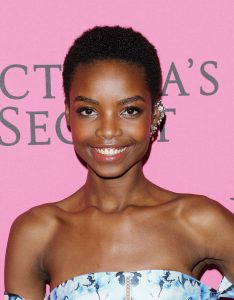
ALMOST…
And this is what African-American girls see and respond to – acceptance of their natural hair, but only on terms created by industries beyond their control. As a result, without greater prevalence and integration in the mainstream, the Afro remains in the closet.
It’s all levels of wrong.
THE CASE FOR INCLUSIVITY AND DIVERSITY
You may ask why a white woman of Northern European descent is rallying the cause for Afros. The truth is, I’ve struggled with the good hair issue. I battled a head a wayward curls for years. I too questioned my hair. Why wasn’t it straight? Why wouldn’t it feather? How come I didn’t have a ponytail like every other girl? I combed the heck out of my curls for years to disastrous results.
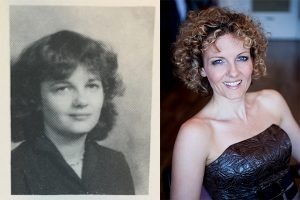
YIKES!
Even as part of the ‘cultural majority’ at the time, I felt pressure to conform. I didn’t want to be different. Add status and race factors to the equation, it’s no surprise African-Americans dodge their natural hair.
Hair is one of the many things that define us, allow us to express ourselves. Stymie this and freedom of expression is hacked off at the knees.
When I finally embraced my curls it was a revelation. This is ME. This is who I am. Empowered. Fierce.
If hair is a crowning glory, it’s time to become Kings and Queens and encourage beauty through diversity. The goal is simple. Every three year old girl – black, white, or any other colour – should be able to look in the mirror with pride and confidence.

